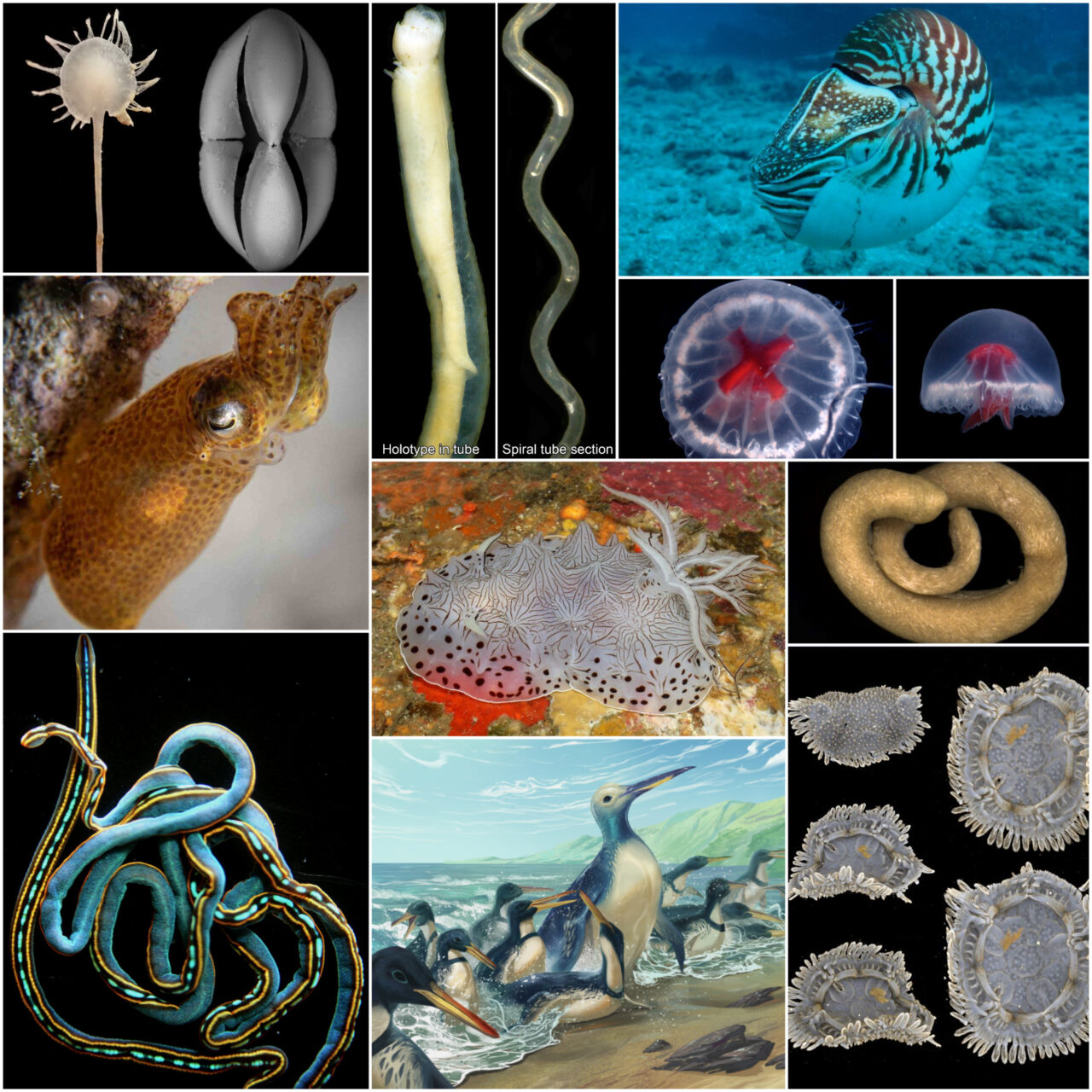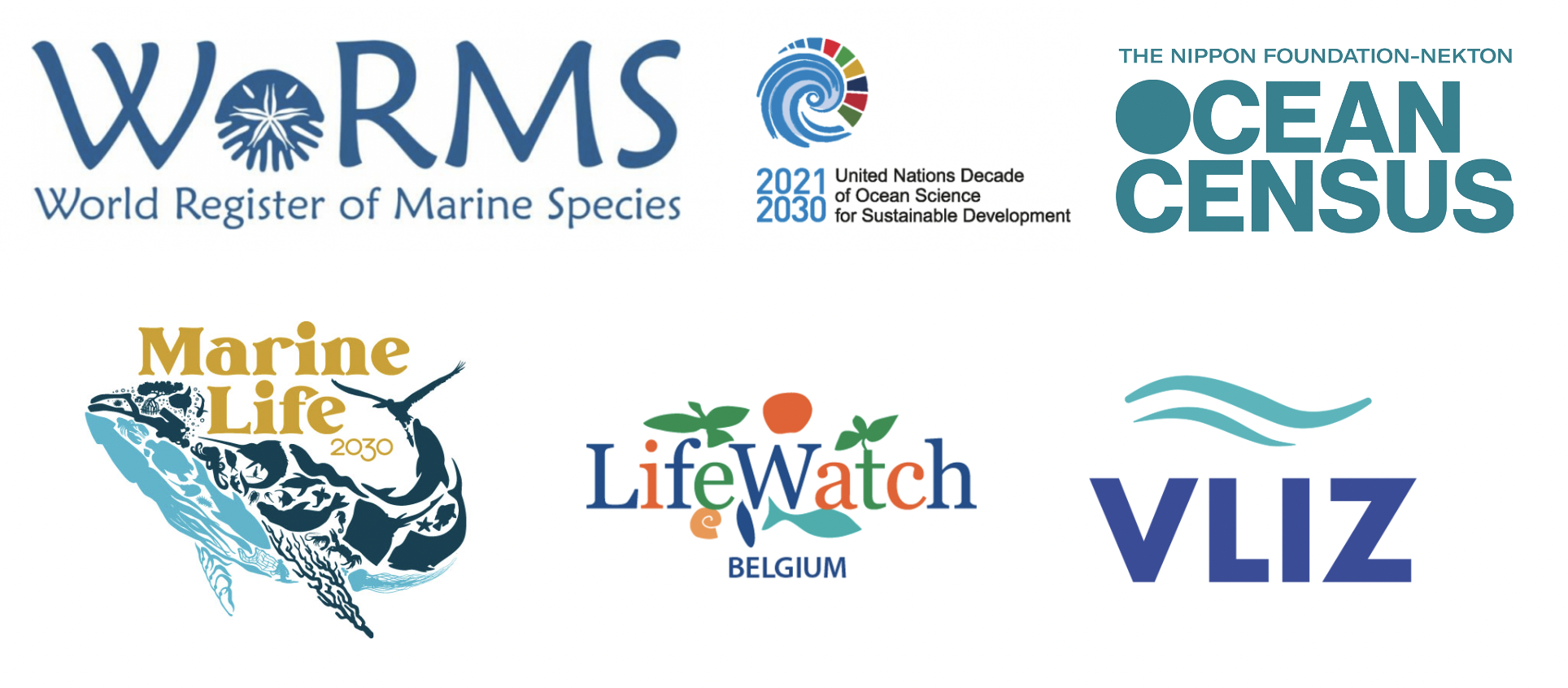
- Falkor’s Carnivorous Sponge, Abyssocladia falkor
- The Bifrost Nemertean, Tetranemertes bifrost
- Solwarawarriors vestimentiferan, Alaysia solwarawarriors
- Hannan’s Pygmy Squid, Kodama jujutsu
- The Samoan Nautilus, Nautilus samoaensis
- Prince Albert’s Sea Daisy, Xyloplax princealberti
- Bouchet’s Dorymenia, Dorymenia boucheti
- Fine Line Nudibranch, Halgerda scripta
- Fordyce’s Giant Penguin, Kumimanu fordycei †
- St. George’s Cross Medusa, Santjordia pagesi
Comme les années précédentes, le Registre mondial des espèces marines(WoRMS) a publié sa liste annuelle des dix meilleures espèces marines décrites par les chercheurs au cours de l'année écoulée. Cette publication coïncide avec la Journée mondiale d'appréciation des taxonomistes, qui a lieu le 19 mars !
Si vous n'étiez pas au courant de cette célébration du travail des taxonomistes, vous pouvez en savoir plus ici et ici.
Every day in labs, museums, and out on fieldwork, taxonomists are busy collecting, cataloguing, identifying, comparing, describing, and naming species new to science. Over 300 taxonomists globally also contribute their valuable time to keeping the World Register of Marine Species up to date. Today is a chance for us at WoRMS to thank our taxonomic editors for this important task. We celebrate the work of taxonomists now with the WoRMS list of the top-ten marine species described in 2023 as nominated and voted for by taxonomists, journal editors and WoRMS users!
This top-ten list is just a small highlight of about 2,000 fascinating new marine species discovered every year (there were almost 2000 marine species described in 2023 and added to WoRMS, including some 330 fossil species).
Comment les espèces ont-elles été choisies ?
A call for nominations was announced in Décembre 2023, sent to all editors of WoRMS and editors of major taxonomy journals, and posted openly on the WoRMS website and social media so anyone had the opportunity to nominate their favorite marine species. Nominated species must have been described between Janvier 1st and Décembre 31st, 2023, and have come from the marine environment (including fossil taxa). A small committee of volunteers (including both taxonomists and data managers) was brought together to decide upon the final candidates. The list is in no hierarchical order.
The final decisions reflect the immense diversity of taxonomic groups in the marine environment (including crustaceans, corals, sponges, jellies and worms) and highlight some of the challenges facing the marine environment today. The final candidates also feature some particularly astonishing marine creatures, notable for their interest to both science and the public.
Each of these marine species has a story. This year the chosen species cover the weird, the bewildering and the astonishing! We feature, amongst others, a beautifully colored nemertean, a carnivorous sponge, and a giant extinct penguin.
À propos de la liste des dix premières espèces marines du WoRMS
After 250 years of describing, naming and cataloguing the species we share our planet with, we are still some way off from achieving a complete census. However, we do know that at least 245,000 marine species have been described because their names are managed in WoRMS by more than 300 scientists located all over the world.
En 2018, pour célébrer une décennie d'existence du WoRMS, nous avons dressé une liste de nos meilleures espèces marines, à la fois pour 2017 et pour la décennie précédente, afin de mettre en lumière les découvertes fascinantes des nombreuses nouvelles espèces marines faites chaque année ( voir http://www.lifewatch.be/en/2018.04.23-WoRMS-LifeWatch-press-release).
We decided to continue this process every year as a celebration of the work that taxonomists do and of the fascinating marine species that are discovered each year. Our previous lists of the top-ten marine species described for the decade 2007–2017, for 2017, 2018, 2019, 2020, 2021 and 2022 can be found here:
- Ten remarkable new marine species from 2007-2017
- Ten remarkable new marine species from 2017
- Ten remarkable new marine species from 2018
- Ten remarkable new marine species from 2019
- Ten remarkable new marine species from 2020
- Dix nouvelles espèces marines remarquables en 2021
- Dix nouvelles espèces marines remarquables en 2022
Between 2008 and 2018, SUNY College of Environmental Science and Forestry (ESF) compiled an annual list of the ‘Top Ten Species’ described from ALL habitats and taxa. The oceans cover over 70% of the surface of our planet, and yet they still include the least explored regions. Although the ESF list often contained one or two marine species, we decided to pay homage to the ‘largest habitat on earth’ by producing our own list of the top marine species.
Nous espérons que certains de nos favoris figureront sur la liste mondiale !
The WoRMS Top Ten Marine Species 2023 would not have been possible without the collaboration between the WoRMS Data Management Team (DMT), the WoRMS Top Ten Decision Committee, the WoRMS Steering Committee (SC) and voluntary contributions by many of the WoRMS editors.
Le travail du DMT et de nombreuses activités liées au WoRMS-DMT sont soutenus par LifeWatch Belgium, qui fait partie de l'infrastructure européenne E-Science LifeWatch pour la recherche sur la biodiversité et les écosystèmes. LifeWatch est un laboratoire virtuel distribué, utilisé pour différents aspects de la recherche sur la biodiversité. L'épine dorsale d'information sur les espèces de LifeWatch vise à rassembler les données taxonomiques et relatives aux espèces et à combler les lacunes dans nos connaissances. En outre, il soutient les experts en taxonomie en leur apportant une aide logistique et financière pour l'organisation de réunions et d'ateliers liés à l'élargissement du contenu et à l'amélioration de la qualité des bases de données taxonomiques.
Le WoRMS - en tant qu'ABC WoRMS - est une action approuvée dans le cadre de la Décennie des Nations unies pour l'océan.
WoRMS and Ocean Census have a partnership to enhance rapid discovery and identification of marine life.
